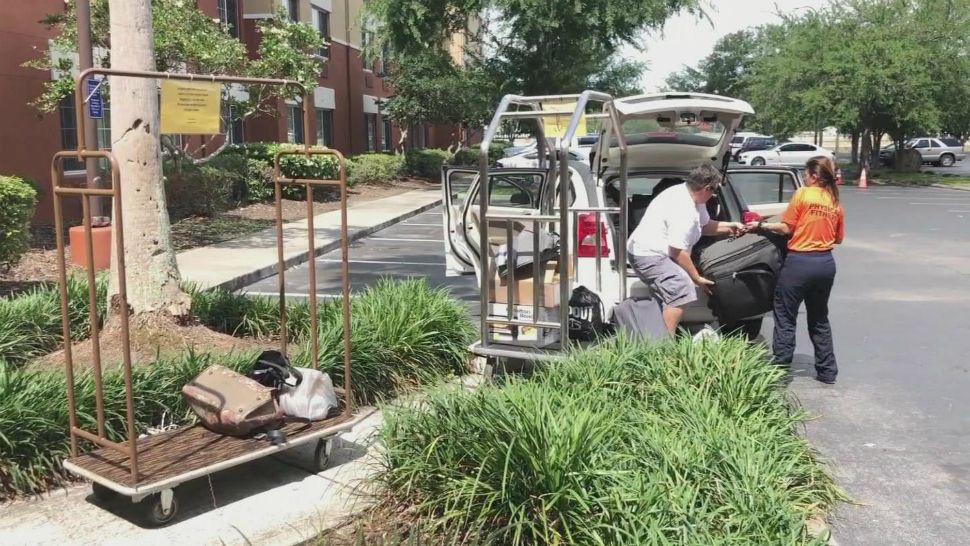KISSIMMEE, Fla. -- A federal judge in Boston heard arguments Monday in a case that seeks to extend FEMA's Transitional Sheltering Assistance (TSA) for Puerto Rican hurricane evacuees.
But he did not make a decision yet. It should come in the next few days.
- U.S. District Judge Leo T. Sorokin held hearing about program on Monday
- He ordered that FEMA cannot end its TSA program
- No final decision has been made yet
- RELATED:
U.S. District Judge Leo T. Sorokin of Massachusetts is preparing to hear new arguments in an effort to extend housing benefits for Puerto Rican hurricane evacuees.
His decision could impact nearly 2,000 Puerto Rican evacuees, including over 500 families in Central Florida.
The temporary housing assistance program was supposed to end last weekend after four extensions.
Sorokin ordered that FEMA could not end its TSA program and temporarily blocked FEMA's plan.
FEMA agreed to keep the program open until July 5.
On Monday attorneys representing the group Latino Justice asked for a six-month extension to the program, saying ending the benefits would be devastating.
Attorneys for FEMA, however, said the program is only meant to be short term, that evacuees were well-aware of the deadlines and that the Puerto Rican governor had not requested the extension, which he is supposed to do.
Some families are still staying at a Kissimmee Holiday Inn, and there are more spread across the area.
Several people who left the island after the storm and have been staying at these FEMA-provided hotels say the main issue for them is finding affordable housing.
"The rent is so high and the requirements. I don't get paid three times the rent in one month and that's basically my problem," explained Ariana Colon.
Last week, a handful of evacuees from the island held a demonstration asking for the governor to step in and ask for an extension on the deadline.
Late on Saturday, Sorokin issued a temporary block on FEMA's plan to cut off funds to those evacuees.
The judge argued that ending the program would have caused "irreparable harm" to hurricane evacuees.
Under the program, FEMA is currently providing hotel shelter to more than 1,700 families across the U.S., including more than 637 families in Central Florida.
That includes Jaykarey Skerette who has been living in a Kissimmee hotel room with her partner and three kids since December.
“I would not wish life in a hotel to anybody," Skerette said.
She says her family moved to Florida after her home was damaged and left without power after Hurricane Maria.
Skerette fears she will have to move her family to the streets if the program is not extended.
“I’m in shock, I’m nervous,” Skerette said. “If the help is gone, what am I supposed to do with my children, where are we supposed to go live?”.
Puerto Rico’s Speaker of the House says he believes the island is ready for residents’ return.
“Nine months later, we are back on our feet,” Puerto Rico’s Speaker of the House Johnny Mendez told Spectrum News 13 Friday.
Mendez was in town attending Republican Party of Florida’s annual “Sunshine Summit.”
"We are looking forward to our people coming back, we have jobs and homes to offer to them again," he said.
Others think there are few opportunities that exist.
The order says the agency cannot end its TSA program until at least midnight on Tuesday. FEMA has stated it will provide assistance until Thursday.
Assistance available
Those seeking resources or assistance should visit www.FloridaDisaster.org/info/Maria. This page contains a consolidated list of federal, state, local, volunteer and commercial resources that are available to individuals and families impacted by the storm.
Options remain for those who need housing and help with their permanent housing plans. We encourage families to:
- Call their FEMA disaster case manager if they have one.
- Call 211 to connect with volunteer agencies that may help.
- Go online to www.FloridaHousingSearch.org to find available housing.
- The U.S. Department of Housing and Urban Development (HUD) offers programs to assist both homeowners and renters with subsidized apartments and housing: www.hud.gov/states/
- Go online here to search HUD for lenders that may help provide finances to rebuild a home. They may also call HUD at 800-569-4287 or TTY 800-877-8339.
Source: Florida Governor's Office



